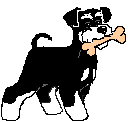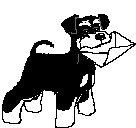POTTY TRAINING A PUPPY. RE-POTTYTRAINING A DOG THAT WAS ONCE POTTY TRAINED. POTTY TRAINING A DOG TO YOUR HOME AND NEW ROUTINE THAT WAS ALREADY TRAINED IN ANOTHER HOME.
Potty Training to a New Home or Environment
Establish a routine
• Take your dog out at the same times every day. For example, first thing in the morning when he wakes up, when you arrive home from work, and before you go to bed.
• Praise your dog lavishly every time he eliminates outdoors. You must praise him and give him a treat immediately after he's finished and not wait until after he comes back inside the house. This step is vital, because rewarding your dog for eliminating outdoors is the only way he'll know that's what you want him to do. SO STAY
GO OUTSIDE WITH THE DOG UNTIL YOU KNOW THE DOG IS POTTY TRAINED OR TRAINED TO YOUR HOME.
• Choose a location not too far from the door to be the bathroom spot. Always take your dog, on leash, directly to the bathroom spot. Take him for a walk or play with him only after he's eliminated. If you clean up an accident in the house, leave the soiled rags or paper towels in the bathroom spot outside. The smell will help your dog recognize the area as the place where he's supposed to eliminate. You can even put the poop from the accident outside where you want the dog to go. Do not let the dog see you doing this.
• While your dog is eliminating, use a word or phrase like "go potty," for example, that you can eventually use before he eliminates to remind him of what he's supposed to be doing.
• Feeding your dog on a set schedule, once or twice a day, will help make his elimination more regular.
Supervise, supervise, supervise
Don't give your dog an opportunity to soil in the house. He should be watched at all times when he's indoors. You can tether him to you with a six-foot leash, or use baby gates, to keep him in the room where you are. Watch for signs that he needs to eliminate, like sniffing around or circling. If you see these signs, immediately take him outside, on a leash, to his bathroom spot. If he eliminates, praise him lavishly and reward him with a treat.
Confinement
When you're unable to watch your dog at all times, he should be confined to an area small enough that he won't want to eliminate there. It should be just big enough for him to comfortably stand, lie down and turn around in. This could be a portion of a bathroom or laundry room blocked off with boxes or baby gates. Or you may want to crate train your dog and use the crate to confine him. If he has spent several hours in confinement, when you let him out, take him directly to his bathroom spot and praise him when he eliminates. Then the dog gets SURPERVISED FREE TIME FOR A LITTLE WHILE BEFORE GOING BACK INTO THE CRATE.
Oops!
Most dogs, at some point, will have an accident in the house. You should expect this, as it's a normal part of your dog's adjustment to his new home or if it is a puppy this is very normal.
• If you catch your dog in the act of eliminating in the house, do something to interrupt him like making a startling noise (don't scare him). Immediately take him to his bathroom spot, praise him even if the dog/puppy already finished inside.
• Don't punish your dog for eliminating in the house. If you find a soiled area, it's too late to administer a correction. Do nothing but clean it up. Rubbing your dog's nose in it, taking him to the spot and scolding him, or any other type of punishment, will only make him afraid of you or afraid to eliminate in your presence. Animals don't understand punishment after the fact, even if it's only seconds later. Punishment will do more harm than good.
• Cleaning the soiled area is very important because dogs are highly motivated to continue soiling in areas that smell like urine or feces.
This is from Paws.org on re-potty training, potty training, or potty training a dog to YOUR home. An adult dog can be potty trained in one home and be totally confused and need shown the new routine in the new environment. This happens with rescue dogs and adult dogs that are rehomed from breeders. Most dogs do great at home but will need taught the new routine in the new home, not mention the stress from being in a new home.
Potty Training to a New Home or Environment
Establish a routine
• Take your dog out at the same times every day. For example, first thing in the morning when he wakes up, when you arrive home from work, and before you go to bed.
• Praise your dog lavishly every time he eliminates outdoors. You must praise him and give him a treat immediately after he's finished and not wait until after he comes back inside the house. This step is vital, because rewarding your dog for eliminating outdoors is the only way he'll know that's what you want him to do. SO STAY
GO OUTSIDE WITH THE DOG UNTIL YOU KNOW THE DOG IS POTTY TRAINED OR TRAINED TO YOUR HOME.
• Choose a location not too far from the door to be the bathroom spot. Always take your dog, on leash, directly to the bathroom spot. Take him for a walk or play with him only after he's eliminated. If you clean up an accident in the house, leave the soiled rags or paper towels in the bathroom spot outside. The smell will help your dog recognize the area as the place where he's supposed to eliminate. You can even put the poop from the accident outside where you want the dog to go. Do not let the dog see you doing this.
• While your dog is eliminating, use a word or phrase like "go potty," for example, that you can eventually use before he eliminates to remind him of what he's supposed to be doing.
• Feeding your dog on a set schedule, once or twice a day, will help make his elimination more regular.
Supervise, supervise, supervise
Don't give your dog an opportunity to soil in the house. He should be watched at all times when he's indoors. You can tether him to you with a six-foot leash, or use baby gates, to keep him in the room where you are. Watch for signs that he needs to eliminate, like sniffing around or circling. If you see these signs, immediately take him outside, on a leash, to his bathroom spot. If he eliminates, praise him lavishly and reward him with a treat.
Confinement
When you're unable to watch your dog at all times, he should be confined to an area small enough that he won't want to eliminate there. It should be just big enough for him to comfortably stand, lie down and turn around in. This could be a portion of a bathroom or laundry room blocked off with boxes or baby gates. Or you may want to crate train your dog and use the crate to confine him. If he has spent several hours in confinement, when you let him out, take him directly to his bathroom spot and praise him when he eliminates. Then the dog gets SURPERVISED FREE TIME FOR A LITTLE WHILE BEFORE GOING BACK INTO THE CRATE.
Oops!
Most dogs, at some point, will have an accident in the house. You should expect this, as it's a normal part of your dog's adjustment to his new home or if it is a puppy this is very normal.
• If you catch your dog in the act of eliminating in the house, do something to interrupt him like making a startling noise (don't scare him). Immediately take him to his bathroom spot, praise him even if the dog/puppy already finished inside.
• Don't punish your dog for eliminating in the house. If you find a soiled area, it's too late to administer a correction. Do nothing but clean it up. Rubbing your dog's nose in it, taking him to the spot and scolding him, or any other type of punishment, will only make him afraid of you or afraid to eliminate in your presence. Animals don't understand punishment after the fact, even if it's only seconds later. Punishment will do more harm than good.
• Cleaning the soiled area is very important because dogs are highly motivated to continue soiling in areas that smell like urine or feces.
This is from Paws.org on re-potty training, potty training, or potty training a dog to YOUR home. An adult dog can be potty trained in one home and be totally confused and need shown the new routine in the new environment. This happens with rescue dogs and adult dogs that are rehomed from breeders. Most dogs do great at home but will need taught the new routine in the new home, not mention the stress from being in a new home.

